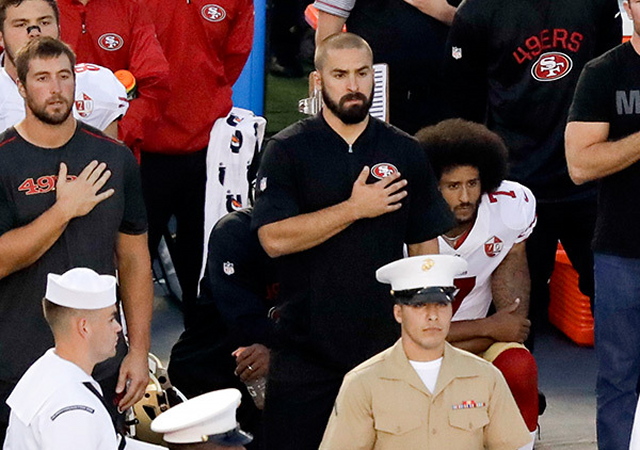Concordia University Prof Fired for Disparaging Remark About Colin Kaepernick
This is just ridiculous…

Using an obvious figure of speech, a Concordia College professor said she would “kill” Colin Kaepernick over his refusal to stand for the national anthem. Now she’s out of a job.
MLive reports:
Concordia University fires professor for remarks related to Colin Kaepernick
An adjunct professor recently was fired from Concordia University after refusing to apologize for remarks students and the university found to be “unfortunate and divisive.”
Concordia Campus Chief Executive Officer Curt Gielow confirmed the university fired the part-time professor on Sept. 22 after she declined to apologize for comments she made during class a couple of days prior at the private liberal arts university in Ann Arbor.
A Facebook live video recorded by a student documenting what was supposed to be her apology shows the professor, Susan Quade, addressing the remarks on Sept. 22. Two days earlier during a discussion in her social psychology class, Quade responded to a student’s question about her thoughts on NFL quarterback Colin Kaepernick’s decision to kneel during the national anthem in protest.
“I said I would kill him,” Quade said in the video captured by student Humphrey Ihejirikah. “I’m not going to kill him. I’m not going to kill anybody. It was a figure of speech.
“I would be pissed off,” she added, in the video. “That’s disrespectful to my country and my flag.”
 DONATE
DONATE
Donations tax deductible
to the full extent allowed by law.








Comments
Imagine being fired for calling a turd a turd. smh
Another “university” firing someone for what is said in class. Academic freedom is dead.
Being an Adjunct is the pits. No respect. No job security. Terrible pay. No fringe benefits.
Humphrey Ihejirkah was not present on the day the original comment was made. If he presented his concerns in front of the class, based on what he heard from other students, the instructor should have invited him to speak with her after class about the issue. Although Humphrey’s video clearly raised awareness, it also provided a very negative portrayal of one person based on one, although insensitive, statement.
An “academic space,” which is something Ihejirkah claims the professor violated, is created and maintained by the professor and the students, not just the professor. The professor is there to serve as a guide, not a dictator or “boss.” Students have just as much, if not more, responsibility to ensure that their time in the classroom is both useful and applicable to their lives and future career. If the students work “against” the instructor or vice versa, the culture of respect and learning becomes non-existent. This is clearly evidenced by this video. The professor showed a lack of respect by refusing to acknowledge the insensitive nature of her comment and Humphrey Ihejirkah showed a lack of respect by secretly recording and publically posting her response.
This video serves as a reminder for instructors, professors, teachers and anyone who speaks to an audience on a daily basis. If you are asked for your opinion about a particular topic you need to be ready to either support that opinion and/or respond to any criticism, questions or challenges as a result of that opinion. As a general rule, many instructors choose not to share their personal opinions in class due to the backlash that can often occur from students, administration and, most recently, the public in general.
This video makes two valid points. First, it is unfortunate that opinions are sometimes shared using insensitive and, often, hurtful words – whether intentionally or unintentionally. Secondly, many Americans are becoming hesitant to share their opinions. It is possible to share our beliefs, opinions and values in a positive and constructive way. However, as evidenced by the reaction to this video (and similar videos), people will not share their opinions because they fear their thoughts will be met with criticism, misunderstanding and/or judgment. Our thoughts suddenly become less of our own when we are punished for sharing them.
Due to the sensitive nature of this issue, Concordia University was obligated to respond. Since Concordia University is a Christian university, it would be assumed that forgiveness was included in the dialogue surrounding this unfortunate event. Christians believe that it is only through Christ’s death that our imperfections and mistakes are forgiven. Christians are obligated to point out the mistakes of their fellow brothers and sisters in Christ, as Ihejirkah did in this video. However, this should be done with the understanding that we, ourselves, are looking into a mirror. The comments, opinions and beliefs that, at times, disappoint, disgust and anger us are the very truths that exist in ourselves.
Ignorance and hate are evidenced in all people, in different forms and contexts. We cannot judge others for failing to “understand” our own experiences when we, ourselves, cannot experience any life but our own. We should feel comfortable pointing out the errors of each other, however, we must also be keenly aware of these imperfections in ourselves. How differently would people view us if our every conversation was secretly recorded and posted for the world to see? Would this illustrate an accurate portrayal of ourselves, or would it provide a platform for our many imperfections and mistakes? Consider the most recent evidence as presented during the presidential campaign. We are all guilty of hurting each other, but we should approach each other in the same manner that we would desire to be approached by anyone who questions our behavior.